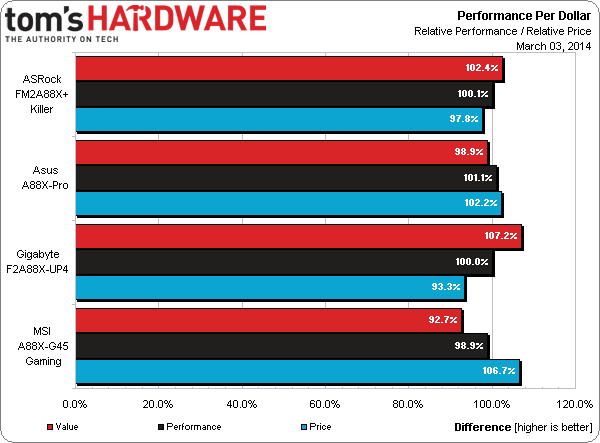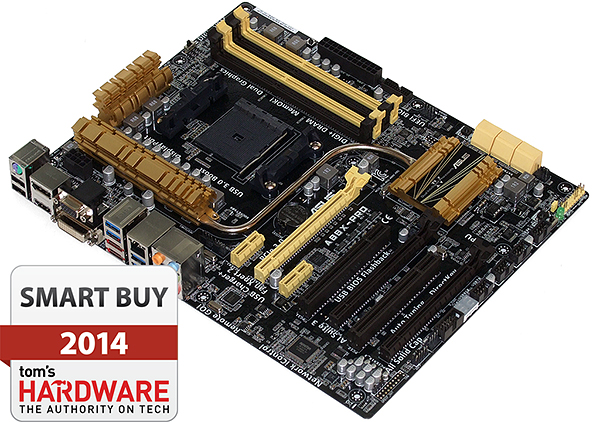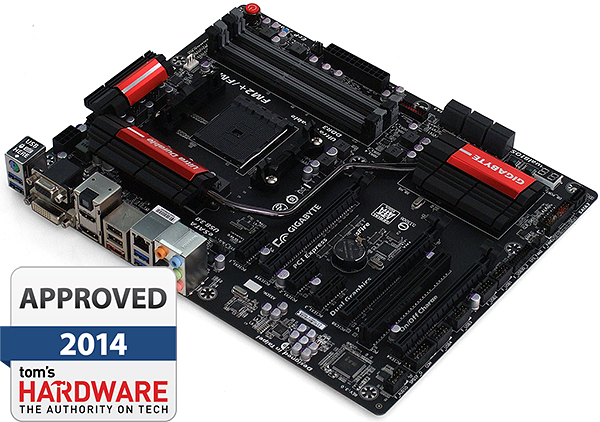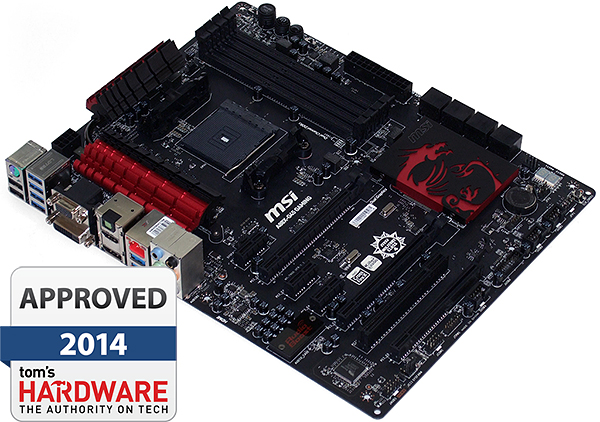Which A88X-Based Board Should You Buy For Your Kaveri APU?
Get Tom's Hardware's best news and in-depth reviews, straight to your inbox.
You are now subscribed
Your newsletter sign-up was successful
Which A88X Motherboard Is Best?
The best board for fans of AMD's Kaveri architecture is a matter of perspective, since each buyer has different needs. It might surprise you, however, that price is not a major factor in this round-up. All of the boards cost between $105 and $120, and the most expensive model includes a game voucher worth at least as much as its price difference.
Anyone who doesn’t care about that game (and to be honest, it hasn't received the most flattering reviews) might be tempted by the chart above. But that purely objective graph also doesn't include the cost of added features, or what those extra capabilities might add to your experience beyond benchmarked performance. Incidentally, besides the included game code, MSI’s A88X-G45 Gaming also has the most inclusive feature set.
In fact, the least extravagant feature set doesn’t even belong to the cheapest board in this round-up. For $110, ASRock’s FM2A88X+ Killer doesn't support a third graphics card. For most folks, that won't be any sort of issue. After all, we're talking about AMD's mainstream APUs here, and any attempt to build a multi-GPU gaming platform is going to be an exercise in imbalance. But the factor still needs to be considered in a value comparison. ASRock does give you the higher-end Qualcomm Atheros Killer GbE controller, but so does MSI's A88X-G45 Gaming.
With its combination of premium integrated networking, three-way graphics card support, extra I/O panel-based USB 3.0 ports, and handy bench testing features, MSI’s A88X-G45 Gaming could have been our top choice for award recognition, and it is a great choice for a mainstream gaming platform with one or two discrete graphics card. It's telling, though, that something as minor as a single USB 3.0 header under the third graphics card slot is what complicates our decision. Not price. Not power. Not performance. But rather, layout.
Gigabyte’s F2A88X-UP4 nearly matches MSI’s feature set, and the Gigabyte board is also the least-expensive in today’s round-up. You do get a larger voltage regulator, if that matters to you, though our tests didn't expose any apparent benefits. Gigabyte also shares MSI’s triple-card USB 3.0 header conflict, but only with the F2A88X-UP4's second front-panel USB 3.0 header. That's right, the motherboard offers two. On the other hand, the F2A88X-UP4 has an issue where it shares one of only two remaining PCI Express slots with the third graphics card slot. As staunch opposition of slot sharing, that affects our judgement, too.
The final contender, Asus’ A88X-Pro, doesn’t have any of those problems. It also comes up shorter on features, though most of the missing capabilities are buttons that get hidden once your machine is buttoned up inside of a case. Asus even takes the precaution of moving its front-panel audio header forward by about an inch, compensating for the design issue of too many cases with leads that are too short. And the middle slot that Gigabyte loses? Asus replaces it with a PCI slot.
Most of us probably don’t care for legacy PCI, but it’s hard to deny an award to the only board in this round-up that doesn't come up noticeably short on features or land on our test bench with a significant design compromise. Even after tacking-on an extra $5 for Asus-exclusive features that many users like (but don’t want to pay for), and even coming up 50 MHz short of our top CPU overclock, Asus’ trouble-free $115 A88X-Pro takes the win.
Get Tom's Hardware's best news and in-depth reviews, straight to your inbox.
Update: 3/20/2014: We love constructive feedback, and many of our readers let us know that the slow third x16-length slot offered by Asus, MSI, and Gigabyte isn’t an important consideration in their purchase decision. Configurations where the extra slot might be important, such as digital signage and crypto-currency mining, usually don’t need front-panel USB 3.0 (blocked on the A88X-G45) or an extra x1 slot (disabled in the F2A88X-UP4). The A88X-Pro retains its higher honor for enabling rarely-used hardware configurations, but the boards that don’t are equally viable to just about everyone. With that in mind, we’re adding our stamp of approval to the F2A88X-UP4 and A88X-G45 Gaming.
-
gadgety To me the point of Kaveri is great graphics in a small package, thus the MB would have to be as small as possible. M-ITX is currently the smallest. Someone should bring out a NUC sized board for the Kaveri.Reply -
blackmagnum On the other side of the fence... Haswell+ Maxwell= performance/watt/buck. You're welcome.Reply -
ta152h The IO device is called PS/2, not P/S 2. It stands for Personal System/2, the IBM product line from 1987. Also, there's a chance there's a big performance gain from Catalyst 14.2, instead of 14.1. Another site did benchmarks comparing 13.6 and 14.2, and the difference was dramatic. It most likely was the somewhere in the 13.6 to 14.1 range, though. I thought the days of one motherboard having significantly faster memory timings than the other died with the IMCs. After being shocked at the horrible performance of the Kaveri, and the almost complete failure of it, between the driver update, and advantage the Asus has, it's clear AMD pulled another "Hawaii", and put their technology in the worst possible light by not packaging it with the proper associated support technologies. Considering the long development cycles for these devices, it's hard to understand how AMD couldn't figure out a proper cooler for the Hawaii, or have drivers degrade performance so much for Kaveri, that within a month or so they were able to increase performance so dramatically. And now, it's clear the memory performance optimizations were far from complete. And Kaveri was a delayed product. It boggles the mind that they consistently fail to find such obvious shortcomings, when everyone else finds them pretty quickly. Clearly, their testing procedures need serious revision in scope.Reply -
ferooxidan "To me the point of Kaveri is great graphics in a small package, thus the MB would have to be as small as possible. M-ITX is currently the smallest. Someone should bring out a NUC sized board for the Kaveri."No, the best NUC will be Haswell + Maxwell, period.Reply -
almarcy Thank you for a useful grid of the current products. I am migrating from my current dinosaur. I am not at all interested in smaller, sleeker, tighter. Just faster. ~4 GHz with 2.4 GHz DDR3 for under $500. seems pretty irresistible :)Reply -
Someone Somewhere Can we see some benchmarks on the Killer card vs other competitors? It feels like FUD to me.Reply -
beerdette "No, the best NUC will be Haswell + Maxwell, period."The point of Kaveri on a NUC would be not to have the space that a graphics card takes. So it wouldn't be the best NUC because then you need to add space for that card.Reply -
de5_Roy Reply
yes. but at a lower price range probably. first, a10 7850k itself has to come down in price by $40-50 outside microcenter.12925440 said:Is anyone actually going to buy an ATX Kaveri motherboard?
-
vertexx Reply12925643 said:
yes. but at a lower price range probably. first, a10 7850k itself has to come down in price by $40-50 outside microcenter.12925440 said:Is anyone actually going to buy an ATX Kaveri motherboard?
Even beyond price, ATX seems pointless with a Kaveri APU. Myself, I'm waiting for the A8-7600 to build a very small (< 3 liters) ITX HTPC running the APU in 45W mode. Although I'm very excited about doing that build, I can't see any use case that makes sense for a Kaveri APU in an ATX form factor. Perhaps the A88x chipset has some feature benefit for building something using the 750 or 760k CPU in a budget build. But the only build I would even think about using a Kaveri APU in would be a mini-ITX PC/HTPC or laptop.
Beyond that, I would love to see Lian-Li come out with a tiny case like the PC-Q02, PC-Q09 or PC-Q12, but with the design for a single 120mm CLC and a 300W SFX PSU to allow a decent overclock on a 7850k APU with the smallest form factor possible (i.e. < 8 liters). That type of build might get me jazzed up for the 7850k.




